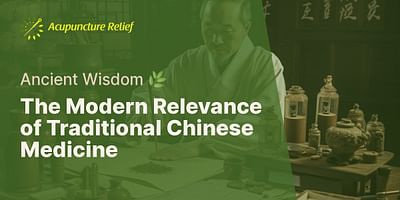Asha Stracke is a certified acupuncturist specializing in mental health. She strongly advocates for the use of acupuncture in stress relief, anxiety reduction, and depression management. Having spent over 8 years in the field, Asha is committed to assisting her clients to reach a state of mental well-being through the practice of acupuncture.
Dear Reader,
Thank you for your interest in the scientific evidence supporting traditional Chinese medicine (TCM). As a licensed acupuncturist with a focus on mental health, I understand the importance of evidence-based practices in healthcare. Let's explore the scientific evidence behind TCM and its benefits.
TCM is a holistic approach to healthcare that has been practiced for thousands of years. It encompasses various modalities, including acupuncture, herbal medicine, dietary therapy, and mind-body practices like tai chi and qigong. While TCM has been widely used and respected, it's essential to examine the scientific evidence to understand its efficacy.
Numerous studies have been conducted to evaluate the effectiveness of TCM modalities, particularly acupuncture. Acupuncture involves the insertion of thin needles into specific points on the body to stimulate the flow of energy, or Qi. Research has shown that acupuncture can be beneficial for a wide range of conditions, including chronic pain, migraines, osteoarthritis, and nausea associated with chemotherapy.
One of the most significant pieces of evidence supporting acupuncture is its inclusion in clinical guidelines and recommendations from reputable organizations. For example, the National Institute for Health and Care Excellence (NICE) in the UK recommends acupuncture as a treatment option for chronic pain conditions such as tension headaches and migraines.
In addition to clinical guidelines, there have been numerous systematic reviews and meta-analyses that have examined the effectiveness of acupuncture. These studies analyze the results of multiple trials to provide a comprehensive overview of the evidence. Many of these reviews have found acupuncture to be effective for various conditions, including lower back pain, knee osteoarthritis, and postoperative pain.
It's important to note that while the scientific evidence supporting TCM is growing, there are still areas that require further research. The complexity of TCM, with its individualized approach and multiple modalities, makes it challenging to conduct large-scale randomized controlled trials. However, smaller studies and clinical observations continue to contribute to our understanding of TCM's benefits.
Furthermore, TCM is not just about the scientific evidence. It is deeply rooted in a holistic philosophy that views the body, mind, and spirit as interconnected. TCM emphasizes the importance of balance and harmony within the body, and its practitioners often take a personalized approach to treatment.
If you're interested in exploring TCM, I encourage you to consult with a qualified TCM practitioner who can provide personalized guidance based on your specific needs. They can help you understand how TCM can complement your existing healthcare regimen and work alongside conventional treatments.
In conclusion, while the scientific evidence supporting TCM is growing, it's important to approach it with an open mind and consider the holistic philosophy behind it. TCM, particularly acupuncture, has shown promising results in numerous studies and is recommended by reputable organizations for certain conditions. If you're considering TCM, consult with a qualified practitioner who can guide you on your journey to better health.
Wishing you wellness and balance,
Maria Rodriguez
Licensed Acupuncturist




















